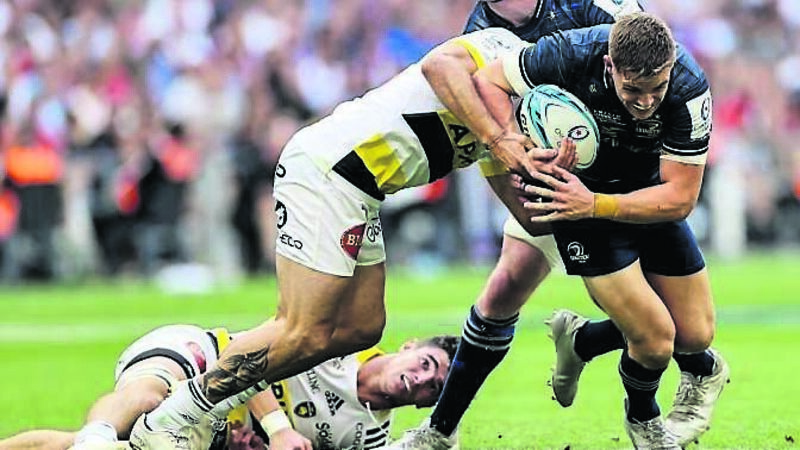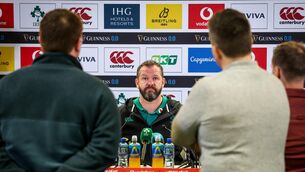Peter Jackson: Shades of Clough about Rog's outpost glory

Heineken Champions Cup Final, The Orange Velodrome, Marseille, France 28/5/2022
Jack Dempsey, the world’s supreme heavyweight boxer a century ago, famously redefined a champion as "someone who gets back up even when he can’t". Ronan O’Gara would long have known exactly what the old Manassa Mauler meant, painfully aware of how it felt to be down and out in the brutal arena of big-time professional sport.
The time, the place, the occasion, the result all conspired to dump the 21-year-old novice from Cork on the bones of his backside in front of 70,000 people.
January 27, 2000, Twickenham, the European Cup final, Northampton 9 Munster 8, the four missed shots at goal; every bit of it is not so much lodged in his memory as seared into it, ‘a brutal lesson’ which the man himself confronted with a matching reality.
"Scored zero points, kicked zero out of four in a high-pressure game which deprived team-mates of a Heineken Cup medal," he said. "It would have been a great reward for the great warriors, those guys who paved the way for everything that’s good about Munster rugby."
The names uppermost in his mind would have been those of Keith Wood, Mick Galwey and Peter Clohessy, three whose time had gone when Munster first cracked Europe six years later. And the same holy trinity sprang to O’Gara’s mind again last week, prompting his confession about how he ‘froze’ on that accursed day in London.
Nobody could have imagined that Leinster, the purveyors of near perfection, the team for all seasons whose tries come from anywhere and everywhere, would end up on the shores of the Mediterranean freezing in the heat. Their fate in that respect can be traced all the way back to how O’Gara confronted his Twickenham demons.
Somehow he dragged himself back to his feet and somewhere deep in his soul a pang or two of the suffering from more than 20 years ago kept driving him ever onwards and upwards, like an unquenchable thirst, to the biggest prize European club rugby has to offer.
It’s almost as if he needs constant compensation for what was lost when the wind blew that fateful last penalty off course and left him staring at the grim reality of falling flat on his face. A typically forensic examination of the non-performance told him what he needed, ‘a bullet-proof technique.’ One lesson was all it took. The craving to avoid another has driven him back to the top of the highest mountain, an achievement which has more than a touch of the Brian Cloughs about it but minus the often gratuitous arrogance: "I wouldn’t say I’m the best manager in the business but I’m in the top one."
The immodesty apart, the parallels are striking. ‘Old Big Head’ took an unfashionable club in a provincial town from the second tier of English football and made them champions of Europe at the first attempt, and again the following season to eliminate any jibes about it having been a flash in the pan.
For Clough and Nottingham Forest, read O’Gara and La Rochelle. There, in the seaport off the beaten track out on the Atlantic, the local rugby club had won nothing in more than 100 years before their promotion from the Second Division eight years ago. Twickenham could accommodate the town’s entire population and still have room for 7,000 more.
They will gladly give O’Gara and his co-saboteur, Munster sidekick Donnacha Ryan, the freedom of the place in gratitude for doing what many had deemed impossible; defusing Leinster as an attacking force. Had the favourites survived the final onslaught, their victory would have been an injustice.
The architect-in-chief of a monumental achievement, an Irishman from another Atlantic shore, can justifiably claim another record infinitely more uplifting than the one he unwittingly set 22 years ago. Munster of 2000 remain the one team to have scored the only try in the European final and lost.
O’Gara is the first to win the blue riband event as a player and head coach, in different countries. Leo Cullen did it for Leinster and Ugo Mola for Toulouse, each without setting sail for distant shores.
As the celebrated American author and master motivator William Arthur Ward wrote: "Adversity causes some men to break, others to break records." It helps if you happen to belong to that rare breed of champion who gets back up when he can’t.
Leinster shutout the biggest shock
Nobody of a D4 blue persuasion can have imagined it would end like this. Leinster losing would have been bad enough but losing without scoring a try? A team that had averaged almost seven per game en route to the final?
Yet La Rochelle did such a number on the favourites that the verdict in their favour seemed even more unanimous than Joe Frazier’s when he outpointed the hitherto unbeaten Muhammad Ali at Madison Square Garden in 1971.
No team in any Heineken final had won the trophy 3-0 on tries since Leicester Tigers at the Parc des Princes in 2001 when Leon Lloyd’s acrobatic touchdown trumped Diego Dominguez’s 10 goals for Stade Francais.
O’Gara’s men shut Leinster down so effectively that their celebrated back division barely got the sniff of a try between them. Instead they were reduced to the mundane matter of kicking penalties, Johnny Sexton landing almost as many in one game as he had for Leinster in the previous six months.
His old Irish rival had been at pains all week to tell anyone who would listen that there was more to the challenger than brute strength.
“My team can play,” O’Gara said, disputing the theory that Leinster had a monopoly on the arts and crafts.
Once Dillyn Leyds’ sleight of hand set them on their way, it all went perfectly to plan for a second-half team who, according to O’Gara, “knew that the last 20 minutes was when we’d get them”. And so it came to pass.
Rugby reluctant to spread gospel
Healey called it
Austin Healey not being everyone’s cup of tea sounds like a contender for understatement of the season but credit where it’s due to the Leicester Lip for a smart piece of punditry at kick-off on BT Sport: "If La Rochelle are in it at half-time, my money’s on them.’"
15 Hugo Keenan (Leinster) 14 Dillyn Leyds (La Rochelle) 13 Garry Ringrose (Leinster) 12 Jonathan Danty (La Rochelle) 11 James Lowe (Leinster) 10 Johnny Sexton (Leinster) 9 Jamison Gibson-Park (Leinster) 1 Cyril Baille (Toulouse) 2 Pierre Bourgarit (La Rochelle) 3 Uini Atonio (La Rochelle) 4 Ross Molony (Leinster) 5 Will Skelton (La Rochelle) 6 Peter O’Mahony (Munster) 7 Josh van der Flier (Leinster) 8 Gregory Alldritt (La Rochelle)









